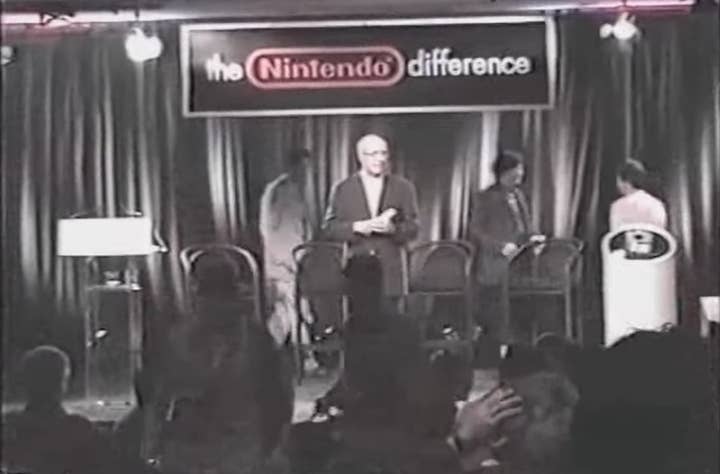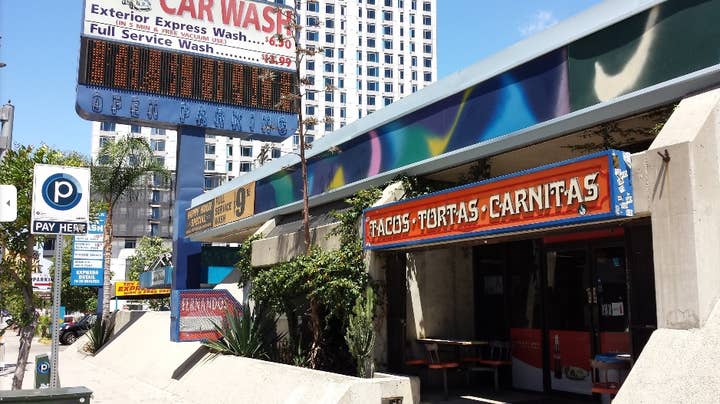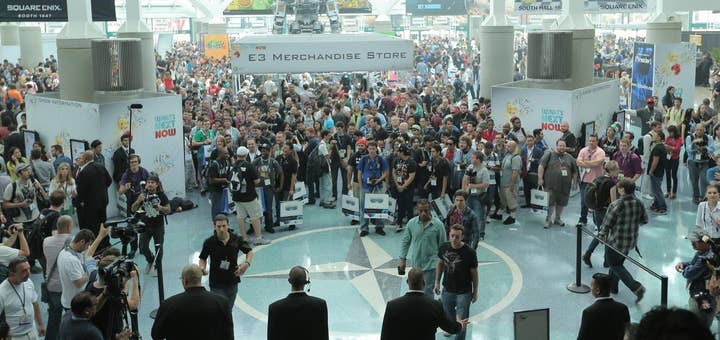E3 will never be the same | This Week in Business
Newsflash: Things change, you cannot go home again, time ages us all and your most cherished experiences probably can't live up to your memories of them
It's E3 week!
Kind of, sort of, but not really.
It's a week in June when a bunch of game companies are making big announcements about things they will want us to buy in the coming months (and years).
But it's not really E3, because the ESA isn't doing E3 this year. And even if it were, it wouldn't really be the E3 people mean when they talk about E3.
Even when E3 was happening every year, it was changing venues and exhibitors, and filling a changing role for an industry seemingly forever in flux. And given the rise of mobile games and PC games in the past decade-plus, the one more-or-less constant of the show -- a focus on the console space -- simply isn't as crucial to the larger health of the industry, or many of the companies that drive it.
So we can look at this and say it's not really E3, but apart from the use of the actual trademark, what does "really E3" even mean?
The first E3 I attended was 2001. The big press conferences were not held in arenas and streamed live on a multitude of platforms.
Nintendo's big coming out party for the GameCube was held in an uncomfortably warm and low-ceilinged hotel conference room. It wasn't live-blogged, much less live-streamed. Executives like Peter Main and Satoru Iwata read lines not from a well-hidden teleprompter, but from scripts they printed out and carried with them on stage. There was an executive Q&A at the end of the show, and it kicked off not with the press attempting to draw more information out of the execs, but with a request for an autograph.

The show itself was sprawling, a multitude of publishers and developers packing every apparent inch of the Los Angeles Convention Center. Kentia Hall was filled with retailers of aftermarket disc cases, light guns that were practically begging to get children shot by cops, knock-off rhythm game peripherals, and some delightfully weird and ambitious actual games. The outlet I was attending for had hired Playboy Playmates to walk the show floor in skimpy clothing handing out branded condoms.
People would practically camp out at the Konami booth for hourly showings of a Metal Gear Solid 2 trailer on a big screen, clogging up aisles and almost certainly creating a fire hazard.
Grand Theft Auto 3 was playable at E3 2001, but the real star of Take-Two's booth was PS2 riot-simulator State of Emergency
Grand Theft Auto 3 was playable at the Take-Two booth, and readily playable without a line. That might have been because the GTA 3 kiosk was stashed behind the real star of Take-Two's show, State of Emergency, which was drawing all kinds of buzz for its riot-simulating mayhem.
Around the Convention Center, attendees who tired of the food options at the overpriced Galaxy Café had few options: Hooters and Fernando's Taco Inn were nearby, with The Original Pantry and Denny's a bit further away for those with time to stroll (and perhaps wait for a table).

The show grew from there, peaking in E3 2005 and 2006. The press conferences had become bigger and more professional, but people were still mainly digesting them by reading live blogs and watching livestreams on press sites that had a nasty tendency to collapse as soon as the show kicked off.
The crowds were similarly bigger, and while they were never overly professional to start with, there was more grousing about them, specifically about whether or not they "belonged" there. While the show was not open to the public, credentials were not particularly difficult to get for anyone with the wherewithal to set up a website (or work for GameStop).
That didn't sit well with publishers, who felt the crowds without legitimate reason to be there were making it harder to get business done. Then for 2007 they decided to strip the show down to about 5,000 invite-only attendees and have the whole thing in a cluster of hotels in nearby Santa Monica.
For 2007 they decided to strip the show down to about 5,000 invite-only attendees and have the whole thing in a cluster of hotels in nearby Santa Monica. Everybody hated it
Publishers especially hated the lack of excitement around the games, which is the sort of thing you might expect to see when you restrict attendance to a handful of people who have been there and done that, and hold the thing in (once again) hotel conference rooms. (This E3 did give us the Jamie Kennedy Activision conference, for what that was worth.)
They returned to the LACC for 2008, but kept the tiny number of invite-only attendees and cut down drastically on the space of the show. People still hated it, so they blew it up to a full-size show in 2009 and grew it again, but left behind Kentia Hall, which was instead used as a parking lot.
I imagine this is the E3 era most people talk about when they say the show isn't what it used to be. Media sites and platform holders had figured out their streaming problems, production values had ramped up, and all the major platform holders and publishers were showing up, even ones who had skipped out on the down-sized shows. (NCsoft was the biggest no-show of E3 2009.)
Perhaps more importantly for the spirits of journalists demoralized from years of choking down Ham Duet sandwiches -- which anthropologists believe to have been a Galaxy Café play on the Star Wars character Han Solo -- the food and entertainment options in the area had grown extensively with the arrival of LA Live, an entertainment complex just a Staples Center away from the LACC.
But the show itself didn't stop changing. The HD generation had taken its toll on the number of mid-size developers and publishers, and their booth space was increasingly taken up by newcomers that played a very different role. The Midways, THQs, and Majescos (among numerous others) faded from view, replaced at least temporarily by Bigpoint, Wargaming, Zynga and other players that found considerable success in PC, mobile, and Facebook.
Nintendo stopped doing live media briefings in 2013, and non-E3 press briefings like the PC Gaming Show and EA Play came up in 2015 and 2016, respectively. Devolver did... whatever you want to call this... in 2017.

By the time Sony confirmed in November of 2018 that it wouldn't be at the next year's E3, the concept of E3 was already sprawling well beyond the confines of the LACC and official ties to the ESA.
Even if the ESA manages to successfully bring it back next year, E3, the actual event, will never be what it was
And of course, two pandemic-cancelled E3s sandwiched around a digital-only event while the industry largely did pretty well haven't made the show seem any more necessary in the meantime.
Even if the ESA manages to successfully bring it back next year, E3, the actual event, will never be what it was. Because it was never the same for very long stretches of time before.
This industry moves entirely too fast to have a representative trade show trapped in amber. And E3 will never be as relevant to gaming as it used to be because gaming extends so much further than a few dozen console companies with the money and desire to build a booth in LA each year.
It can come back, and it can even be better -- although there's plenty of reason to be skeptical, particularly with Fernando's Taco Inn having shut down during the pandemic -- but it can't be the same.
The rest of the week in review
STAT | 20 - The number of years, as of today, GamesIndustry.biz has been operating. You can read the story about the site's creation here, and -- if you're in Brighton next month -- book tickets to our birthday party.
QUOTE | "As the industry evolves, we should expect showcases like E3 to become more like this. An event with fewer reveals, and more in-depth looks at something you probably already knew about. An event that's less about logos, and more about the games underneath. And I think that will make for a better show." - Our own Chris Dring reflects on the evolution of E3 (and this year's non-branded mish-mash of temporally adjacent showcase events).
STAT | 21% - The year-over-year decline in game sales across Europe in May, according to GSD data. Nintendo Switch Sports topped the chart.
STAT | 8% - The percent of Twitch user reports for hateful conduct, sexual harassment, and harassment that resulted in bans or warnings in 2021. That sounds bad, but it actually represents considerable improvement, as the number is four times the enforcement rate the platform had for 2020.
QUOTE | "If you're going to be facing some kind of PR scandal, something where child safety is at risk is probably the most threatening event that could occur. And the vetting is what has allowed us to avoid those risks." - On the fifth anniversary of Microsoft and Mojang's monetized user-generated content storefront, Minecraft Creator Marketplace head Aaron Buckley talks about the moderation and vetting efforts that let it dramatically increase the amount of content available for players through the game proper while keeping it free from the sort of scandals and criticisms that have dogged more open platforms.
QUOTE | "One QA source recounted how badly they wanted to stop working, despite their financial need. When they almost broke a bone on the stairs, they fantasized about the prospect of being too injured to go to work the next day. They said it was the most comforting feeling they felt while working crushing hours on Fallout 76." - A Kotaku report about Bethesda's treatment of QA testers during the development of Fallout 76.
QUOTE | "At first, you scratch your head and say that most players online hate bots. But the reality is that bots are a really good on-ramp for brand new players. They can be effective in tutorials. In a game like ours, if you're not with friends, smart bots can be really good team mates as well." - Velan Studios president Guha Bala talks about adding AI-controlled players to Knockout City to make the game more approachable to new players.
STAT | A little over two years - How long portable electronics manufacturers have to ensure that all small- and medium-sized portable devices sold in the European Union will use the USB Type-C format for their charging ports.
QUOTE | "[Parent company] Sega had a bigger preference for one of the others, Two Point Precinct. But we were so excited by the idea of Two Point Campus, because we kept coming up with new ideas." - Two Point's Mark Webley talks about the management sim studio's desire to start with something familiar to people rather than something instantly exciting.
QUOTE | "The public's uncertainty of our status in the last few months have understandably led to an influx of pre-order refund requests. Because of reduced staff and financing requirements for continued operation, our responses to and processing of these requests has been delayed." - Intellivision CEO Phil Adams says the company laid off people and is still trying to get the Amico out the door, but I don't think it's a good sign when the company has to choose between filling refund requests and keeping the lights on.
QUOTE | "Things change: life unfolds; priorities shift, and people come and go. And the same goes for Giant Bomb." - Giant Bomb announces the departure of Jeff Gerstmann, the site's last remaining founding member.
QUOTE | "In an unexpected life twist, I've been given the opportunity to explore a career outside of media/journalism, and I'm unbelievably excited for the future." - IGN editor-in-chief Tina Amini announcing her departure from the site and journalism entirely.
